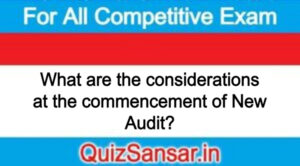
What are the considerations at the commencement of New Audit?
What are the considerations at the commencement of New Audit?
Ans.
CONSIDERATIONS AT THE COMMENCEMENT OF NEW AUDIT
An audit is generally conducted with some definite objects in view. This object should be constantly kept in mind in the initial stages of the audit.
(1) He (the auditor) should see that his appointment in case of a joint-stock company is in accordance with the provisions of the Companies Act. If he does not do so, he will be held liable. If he has been appointed in place of a other auditor, he should require from the retiring auditor, the reasons for the changes.
(2) He should obtain definite instructions from his clients about the nature and scope of his work and duties; whether he is to do the accountancy work or audit work or both by which date the work is to be completed, his honorarium, time by which the report is required etc. Usually an agreement between an auditor and a client is made verbally but it will be better if the auditor sends a letter of confirmation embodying the terms of contract, scope of work, when the work is to be done, audit fee payable and so on to avoid any dispute later on. This question will not arise in the case of audit of accounts of a joint-stock company as his duties, rights, powers, liabilities, etc., are all laid down by the Companies Act itself.
(3) He should examine the system of accounting employed, by his client. If he finds any weak point he must study it thoroughly and make recommendations to his client to remove these weak spots.
(4) He should then obtain a list of all the books maintained in the office, together with the names of the keepers of such books and their specimen signatures. Such a list should be duly signed by a responsible official of the company. If this is not done, it is possible that he may not have examined some books which had a bearing on the balance sheet. Moreover, he is, in case of joint stock companies, required by the Companies Act to state in his report that proper books have been kept by the company. Again he is also required to state that the balance sheet and the profit and loss account are in agreement with the books of account and (in the case of branches) returns. Thus, the auditor runs a great risk, “if he omits to examine any of the books which has a bearing on the accounts. He should arrange appointments with key personnel.
(5) If internal check system is in operation he should get, if possible, a written statement to that effect and examine that system.
(6) He should get a list of the officers of the company containing particulars about their duties powers and their specimen signatures.
(7) If the business is of a technical nature, he would do well to visit the works, acquire technical knowledge to some extent, before he actually commences the work so that he may be able to put intelligent questions to his clients and may not appear to be ridiculous by putting absurd questions and may not be deceived by the clerks who may take undue advantage of his lack of technical knowledge.
(8) He should ask the clients to balance the books, prepare the final accounts and the balance sheet, file the vouchers in order of occurrence of the transactions, prepare the schedules of the debtors-good, doubtful and bad debts, creditors, important legal papers, contracts, list of securities, etc., if this has not been done so far. He should never begin his work until the books have been balanced.
(9) He should obtain the previous year’s audited balance sheet, if any, and see that the accounts during the current year have been opened with those balances which appeared in the previous balance sheet.
(10) He should get the report of the auditor, if any, relating to the accounts of the previous year for information regarding the state of the affairs of the company during that year.
(11) He must read those clauses of the Memorandum of Association and the Articles of Association of the company which have a bearing on the accounts or the Articles of Partnership of the firm whose accounts he is auditing or Will or Trust Deed in case of an audit of a Trust or Special Acts or Statutes in case of a public utility concern, etc.
(12) If it is the first audit of a company, he must also go through prospectus, contracts with the vendors, promoters etc.
- What is meant by Database Management System?
- Discuss the advantages and drawbacks of database.
- What do you mean by database ? Discuss its Characteristics.
- What is Data Mining?
- What are the conditions of communication?
- What do you mean by business communication ?
- organization / Differentiate between classical and modern theory of organization
- What is forecasting






